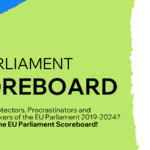Members of the European Parliament from all major political parties tabled amendments for strengthening the ambition of the EU Emissions Trading Scheme post-2020. Climate Action Network (CAN) Europe welcomed this development, but stressed that only the most ambitious amendments are in keeping with Europe’s environmental obligations.
Members of the European Parliament’s Environment Committee, which takes the lead on the proposal how to reform the EU Emissions Trading Scheme (ETS) in the Parliament, are going to discuss amendments to the report forming the Committee’s position on 29 September.
Analysis of the tabled amendments carried out by Climate Action Network (CAN) Europe shows that MEPs across the political spectrum call for scaling up emission cuts under the ETS. Lawmakers demand a more ambitious starting point for the carbon budget than the one proposed by the European Commission in July 2015, urging that it should be calculated on the basis of real emissions. They also want to accelerate the rate at which emissions permits will be removed from the market between 2020 and 2030, via the so called Linear Reduction Factor.
“It’s encouraging to see MEPs across the political spectrum calling for more environmental ambition in the next carbon budget” – Damien Morris of Climate Action Network (CAN) Europe said. “But this is no time for half measures: only the most ambitious amendments come anywhere near to fulfilling Europe’s obligations under the Paris Agreement. We urge conscientious MEPs to support these.”
A briefing paper A Fresh start for the ETS: setting the phase 4 starting point at actual emissions published by CAN Europe today provides more details on the starting point for emission reductions. It shows that starting from the ETS target set for 2020, as proposed by the European Commission, would build oversupply into the new carbon budget right from the start. This is because the EU’s emissions are expected to fall as much as 38% below 2005 levels by 2020, when the cap will be only 21% below 2005 levels that year. To avoid a new surplus CAN Europe is calling for the ETS starting point to be set at actual emissions (average of 2017-2019 emissions) instead of the 2020 target.
Notes:
Main ENVI amendments concerning the starting level and the Linear Reduction Factor (LRF), ranked in order of their environmental ambition:
| MEP | Group | Description of amendment | |
| 1 | Michele Rivasi | Greens | 4.2% LRF from 2020 emissions or 2020 cap (whichever lower) |
| 2 | Eleonora Evi | EFDD | 4% LRF compared to 2016-2018 emissions |
| 3 | Sirpa Pietikainen | EPP | 3.3% LRF compared to 2016-2018 emissions |
| 4 | Bas Eickhout | Greens | 2.8% LRF vs 2020 emissions or 2020 allocations (whichever lower) |
| 5 | Christel Schaldemose | S&D | 2.4% LRF (vs Phase 2) starting from 2018 to 2020 avg emissions |
| 6 | Gerben-Jan Gerbrandy | ALDE | 2.4% LRF (vs Phase 2) starting from 2016 to 2018 avg emissions |
| 7 | Seb Dance | S&D | 2.2% LRF (vs Phase 2) starting from 2016 to 2018 average |
| 8 | Jytte Guteland | S&D | 2.4% LRF (vs Phase 2) |
The next important moments in the reform of the EU Emissions Trading System (ETS) will be the votes in the European Parliament’s ITRE and ENVI Committees on 13 October and 8 December, as well as a debate of the EU’s Environment Ministers on 19 December 2016.
Contact:
Ania Drazkiewicz, CAN Europe Communications Coordinator, ania@caneurope.org, +32 494 525 738
Wendel Trio, CAN Europe Director, wendel@caneurope.org, +32 473 170 887
Climate Action Network (CAN) Europe is Europe’s largest coalition working on climate and energy issues. With over 130 member organisations in more than 30 European countries – representing over 44 million citizens – CAN Europe works to prevent dangerous climate change and promote sustainable climate and energy policy in Europe.


